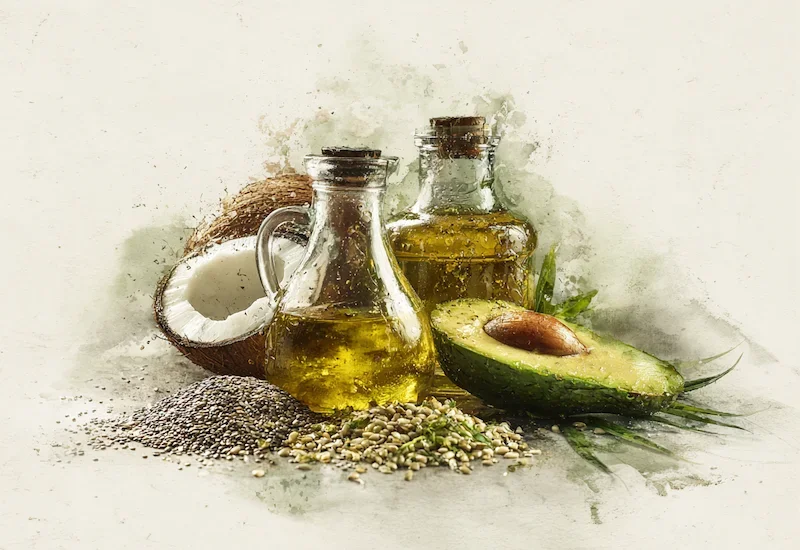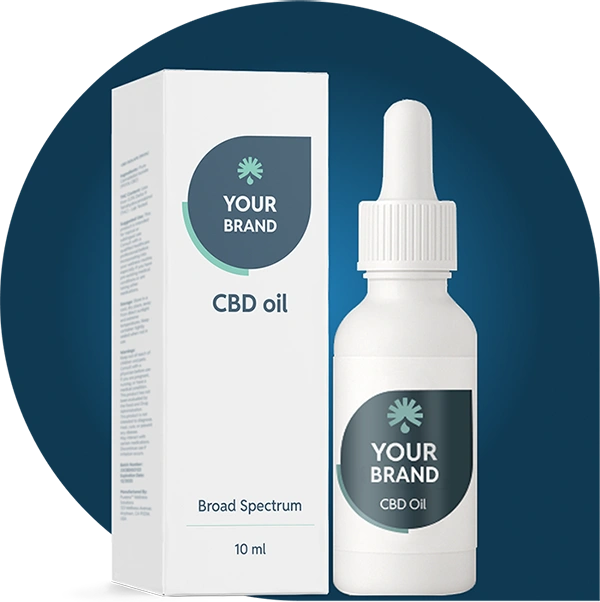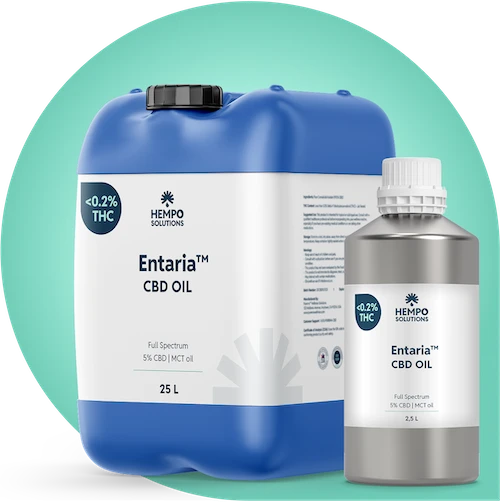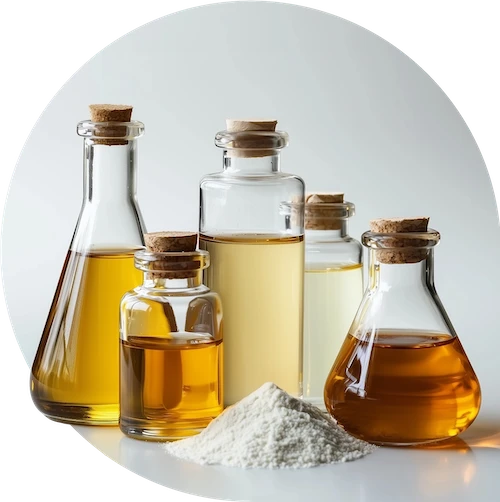What Is a CBD Carrier Oil?
CBD carrier oils are essential ingredients in finished CBD formulations. From a manufacturing perspective, they ensure that highly concentrated CBD extracts, such as isolates or distillates, can be transformed into safe, reliable, and user-friendly products.
Raw CBD extracts on their own are highly potent and often have poor bioavailability when consumed directly. By dissolving these extracts into a carrier oil, manufacturers improve the stability, consistency, and absorption of the final product. Carrier oils also allow precise, repeatable dosing, which is critical for brand trust and regulatory compliance.
At Hempo Solutions, we view carrier oil selection as a strategic formulation decision. The right choice affects not only bioavailability but also taste, texture, shelf life, and even allergen labelling requirements in your target market. Choosing high-quality, food-grade, and compliant carrier oils is an essential part of delivering premium White-Label CBD products to your customers.
Why does CBD need a carrier oil?
CBD extracts like distillates or broad-spectrum oils contain high concentrations of cannabinoids and other plant compounds such as terpenes and polyphenols. While these compounds have potential benefits, they are naturally unstable and prone to degradation if left unformulated. Dissolving them in a carrier oil helps stabilise these ingredients, protecting them from oxidation and extending shelf life.
From a bioavailability perspective, carrier oils are equally critical. Cannabinoids are fat-soluble, meaning they dissolve in oil rather than water. When formulated in a carrier oil, CBD can be more readily absorbed in the digestive system, especially when taken sublingually or ingested. Carrier oils can also help shield CBD from harsh gastric conditions, supporting its survival through the digestive tract and improving overall absorption.
For manufacturers, this means carrier oils are not optional extras, they are essential formulation components. Selecting the right carrier oil helps deliver consistent quality, supports product stability, and ensures an effective delivery system that meets both regulatory and customer expectations.
Benefits of CBD Carrier Oils
CBD carrier oils do much more than simply dilute concentrated extracts. For manufacturers, they are fundamental to delivering reliable, effective, and market-ready CBD products. Below are key benefits that make carrier oils essential in professional CBD formulation.
Improved Absorption and Bioavailability
Cannabinoids are fat-soluble compounds that dissolve readily in oils. This property allows them to be absorbed more effectively in the digestive system when delivered with fats. Carrier oils help transport CBD through the lymphatic system, supporting higher bioavailability compared to unformulated extracts. For brands, this translates into more effective products that deliver consistent results for customers.
Easier and More Precise Dosing
Highly concentrated forms such as CBD isolate or distillate are challenging to measure accurately without dilution. Incorporating a carrier oil ensures even distribution of CBD throughout the product, making it simpler to deliver precise, repeatable doses. This is essential for maintaining customer trust and meeting regulatory requirements for accurate labelling.
Enhanced Product Stability
Carrier oils help stabilise cannabinoids and other beneficial plant compounds by protecting them from degradation due to light, heat, and oxygen. This extends the product’s shelf life and ensures the end user receives a consistent, effective dose over time. Stability is a key quality factor in professional CBD production.
Supports Custom Formulation
Carrier oils provide a versatile base for creating differentiated products. At Hempo Solutions, we use carrier oils to blend in specific terpenes, essential oils, and other botanicals tailored to client needs. This enables brands to develop targeted formulations for topical or ingestible use while ensuring compatibility, safety, and effectiveness.
Regulatory and Allergen Considerations
Selecting the right carrier oil also involves planning for allergen risks and compliance requirements. Some oils (such as nut- or seed-derived options) may require allergen labelling in certain markets. Using food-grade, compliant carrier oils supports smooth market entry and reduces legal risk for brands expanding into new regions.
The Most Popular CBD Carrier Oils

Selecting the right carrier oil is a crucial decision for CBD manufacturers. Each option has its own characteristics that influence bioavailability, taste, consistency, regulatory compliance, and allergen considerations. Below we break down the most commonly used carrier oils in CBD production, with practical insights into their pros and cons.
MCT (Coconut) Oil
MCT (medium-chain triglyceride) oil is the most widely used carrier oil in CBD products due to its higher bioavailability according to studies. Typically derived from coconut oil through fractionation, it is valued for its ability to enhance bioavailability and deliver consistent dosing.
Pros:
-
Quick absorption thanks to medium-chain structure.
-
Light, thin, nearly flavourless.
-
Minimal processing requirements.
-
Cost-effective compared to many alternatives.
-
Supports stable, consistent formulations with long shelf life.
Cons:
-
Can cause temporary digestive side effects (nausea, gas, diarrhoea) in sensitive users.
-
Not suitable for people with liver disease or those on certain medications.
-
Requires consideration of sourcing practices to ensure sustainability.
Hemp Seed Oil
Hemp seed oil is produced by cold-pressing hemp seeds. While it contains minimal cannabinoids itself, it offers unique plant-based nutrients and is popular in full-spectrum formulations that aim for the entourage effect.
Pros:
-
Rich in omega-3 and omega-6 fatty acids.
-
Contains antioxidants and minerals like magnesium, iron, and zinc.
-
Supports a natural hemp-derived positioning for brands.
-
Can contribute to the entourage effect in full-spectrum formulations.
Cons:
-
Lower solvency for dissolving CBD compared to MCT oil.
-
More expensive in some markets.
-
Distinct, herbal flavour that may require taste-masking.
-
Allergen labelling may be needed in certain jurisdictions.
Olive Oil
Olive oil is well-known for its health credentials, but its formulation properties make it less popular for many CBD products.
Pros:
-
Rich in vitamins E and K, iron, and antioxidants.
-
Well-researched and widely trusted.
-
Absorbs through the skin effectively for topical uses.
Cons:
-
Thicker consistency and strong flavour can be challenging for ingestibles.
-
Lower solvency for CBD compared to MCT oil.
-
Long-chain triglycerides require more metabolic processing.
Avocado Oil
Avocado oil is valued for its nutrient profile and ease of skin absorption, but it comes at a higher cost.
Pros:
-
High in vitamins A, B, D, and E.
-
Rich antioxidant content.
-
Pleasant, nutty flavour profile for some applications.
-
Effective for topical formulations.
Cons:
-
Thicker texture can impact mouthfeel.
-
Significantly more expensive than many alternatives.
-
Higher allergen risk compared to other oils.
Grapeseed Oil
Grapeseed oil is popular in skincare products for its light texture but has limitations as a primary CBD carrier oil.
Pros:
-
Light consistency, quickly absorbed by the skin.
-
Neutral taste profile.
-
High in vitamin E and antioxidants.
Cons:
-
Lower saturated fat content reduces CBD bioavailability.
-
Less common and potentially pricier depending on market.
-
Allergen considerations for individuals with grape allergies.
-
Best used as a secondary ingredient in blends rather than a primary carrier.
Why Do We Recommend Using MCT Oil?
At Hempo Solutions, we work with a variety of carrier oils depending on client needs, formulation goals, and regulatory markets. However, after extensive testing and production experience, we consistently find that MCT oil, especially when sourced from high-quality coconut oil, offers the most reliable benefits for the widest range of CBD products. Below, we explain why we frequently recommend MCT oil to our B2B partners.
Optimised Bioavailability
One of MCT oil’s standout qualities is its ability to significantly improve CBD’s bioavailability. Medium-chain triglycerides are absorbed more efficiently than long-chain fats, entering the bloodstream quickly via the lymphatic system. This efficient delivery mechanism helps ensure that more of the active CBD reaches systemic circulation. For manufacturers, this means the potential to achieve effective results with lower doses, supporting cost-efficient formulations while meeting customer expectations for potency.
Efficient and Consistent Delivery
MCT oil’s molecular structure allows it to evenly distribute CBD throughout the product. This is critical for precise dosing, especially in ingestible formats where consistency builds consumer trust and supports regulatory compliance. In our own manufacturing processes, we have found MCT oil to deliver a uniform product with minimal batch-to-batch variation, helping brands maintain high quality standards and reliable user experiences.
Supports Long-Term Stability
MCT oil is also valued for its oxidative stability and long shelf life. It resists rancidity better than many alternative oils, preserving the integrity of the cannabinoids and other bioactive ingredients over time. For B2B partners, this means reduced risk of spoilage, simpler inventory management, and more predictable shelf life labelling.
Practical for Diverse Formulations
Because it is light, nearly flavourless, and compatible with both ingestible and topical products, MCT oil offers remarkable formulation versatility. Whether a brand is developing CBD tinctures, capsules, balms, or cosmetics, MCT oil supports a seamless development process without introducing strong flavours or unwanted textures. This flexibility makes it a valuable choice for manufacturers looking to streamline production while meeting varied market demands.
Regulatory Considerations
We also prioritise food-grade, allergen-aware sourcing for our MCT oil. It is generally well tolerated by most consumers, though manufacturers should note that it may not be suitable for individuals with certain health conditions, such as liver disease. For B2B brands, selecting compliant, fully documented carrier oils is vital for meeting food supplement regulations, allergen labelling requirements, and cosmetic safety standards in your target markets.
Summary
Carrier oils are not an optional add-on in CBD production, they are fundamental to creating effective, reliable, and compliant products. By dissolving cannabinoids and supporting their absorption, carrier oils enable consistent dosing, improved bioavailability, and longer shelf life.
While many oils offer potential benefits, MCT oil stands out for its superior absorption properties, stability, mild flavour profile, and broad formulation compatibility. At Hempo Solutions, we recommend MCT oil for most applications based on extensive testing, client feedback, and production experience.
Ultimately, choosing the right carrier oil is a strategic decision that affects product quality, customer experience, and regulatory compliance. We encourage all our partners to consider these factors carefully when developing custom CBD Product formulations, and we are always here to support brands in making informed, effective choices.







